Case Study: Signs, Symptoms, and Management of Renal Failure
VerifiedAdded on 2020/03/04
|7
|1591
|136
Case Study
AI Summary
This case study presents the case of Mr. Goodpasture, a patient suffering from end-stage renal disease, hypertension, seasonal rhinitis, and depression. The case details his symptoms, including nausea, malaise, and pruritus, along with his biochemistry and haematology results, which indicate severe kidney damage. The patient's medical history, including hypertension and potential links to seasonal rhinitis, is explored. The study also addresses the management of chronic renal failure, including the use of dialysis and the importance of managing secondary symptoms like pain, weakness, and pruritus. The case highlights the need for careful medication management, considering the patient's renal status and comorbid conditions, emphasizing the importance of a collaborative approach involving various specialists. The references provided support the analysis with relevant research on the topic.
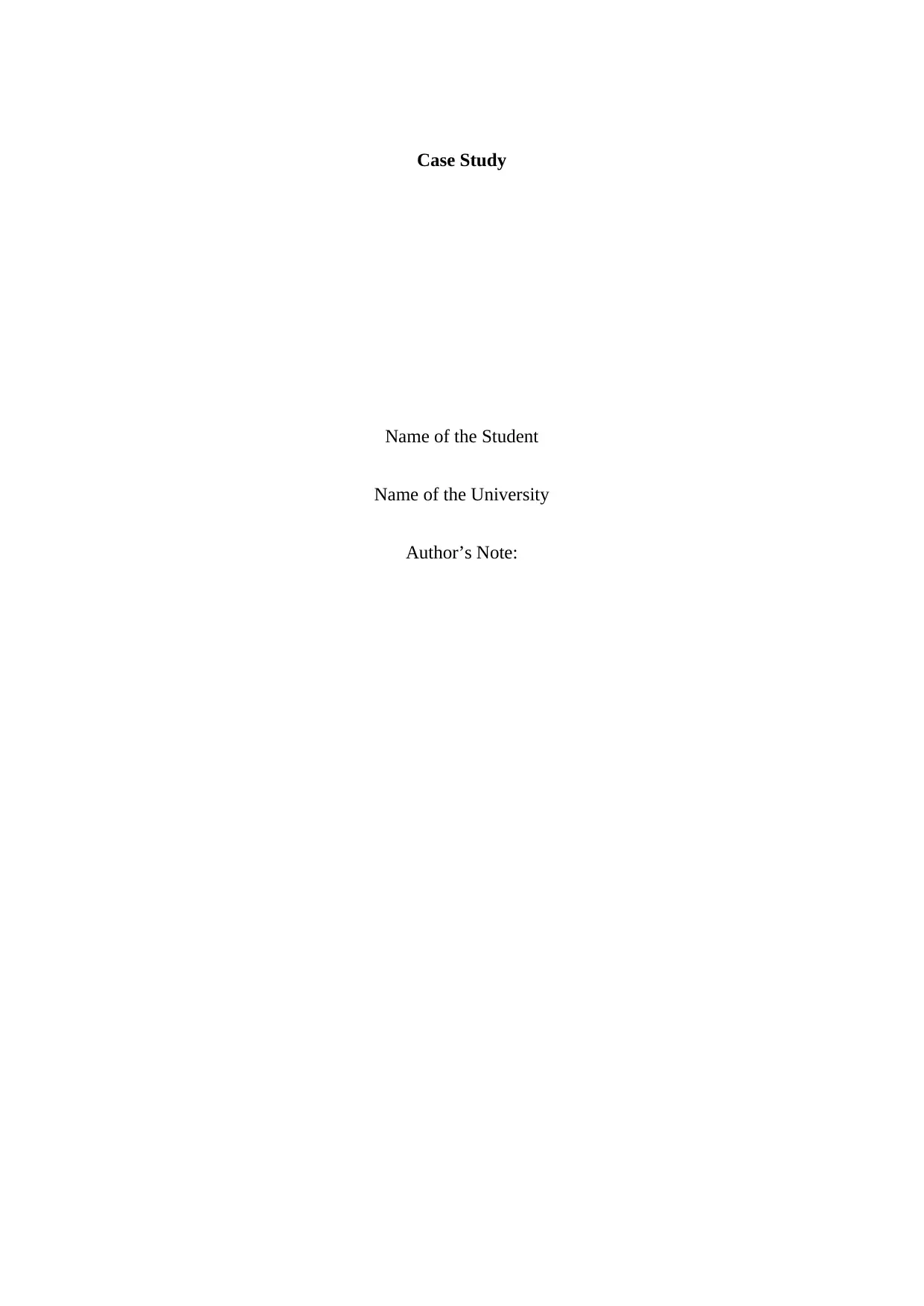
Case Study
Name of the Student
Name of the University
Author’s Note:
Name of the Student
Name of the University
Author’s Note:
Paraphrase This Document
Need a fresh take? Get an instant paraphrase of this document with our AI Paraphraser
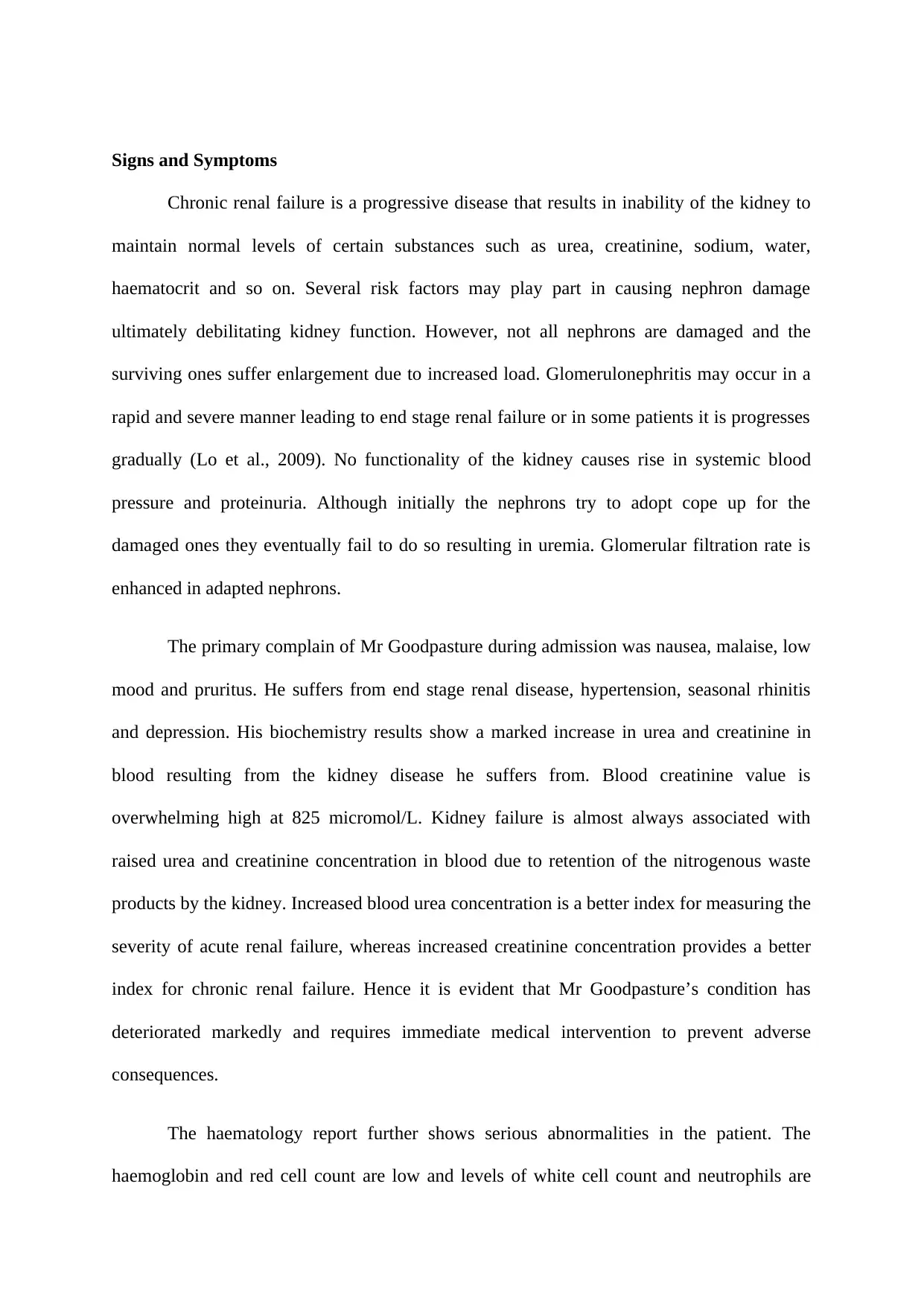
Signs and Symptoms
Chronic renal failure is a progressive disease that results in inability of the kidney to
maintain normal levels of certain substances such as urea, creatinine, sodium, water,
haematocrit and so on. Several risk factors may play part in causing nephron damage
ultimately debilitating kidney function. However, not all nephrons are damaged and the
surviving ones suffer enlargement due to increased load. Glomerulonephritis may occur in a
rapid and severe manner leading to end stage renal failure or in some patients it is progresses
gradually (Lo et al., 2009). No functionality of the kidney causes rise in systemic blood
pressure and proteinuria. Although initially the nephrons try to adopt cope up for the
damaged ones they eventually fail to do so resulting in uremia. Glomerular filtration rate is
enhanced in adapted nephrons.
The primary complain of Mr Goodpasture during admission was nausea, malaise, low
mood and pruritus. He suffers from end stage renal disease, hypertension, seasonal rhinitis
and depression. His biochemistry results show a marked increase in urea and creatinine in
blood resulting from the kidney disease he suffers from. Blood creatinine value is
overwhelming high at 825 micromol/L. Kidney failure is almost always associated with
raised urea and creatinine concentration in blood due to retention of the nitrogenous waste
products by the kidney. Increased blood urea concentration is a better index for measuring the
severity of acute renal failure, whereas increased creatinine concentration provides a better
index for chronic renal failure. Hence it is evident that Mr Goodpasture’s condition has
deteriorated markedly and requires immediate medical intervention to prevent adverse
consequences.
The haematology report further shows serious abnormalities in the patient. The
haemoglobin and red cell count are low and levels of white cell count and neutrophils are
Chronic renal failure is a progressive disease that results in inability of the kidney to
maintain normal levels of certain substances such as urea, creatinine, sodium, water,
haematocrit and so on. Several risk factors may play part in causing nephron damage
ultimately debilitating kidney function. However, not all nephrons are damaged and the
surviving ones suffer enlargement due to increased load. Glomerulonephritis may occur in a
rapid and severe manner leading to end stage renal failure or in some patients it is progresses
gradually (Lo et al., 2009). No functionality of the kidney causes rise in systemic blood
pressure and proteinuria. Although initially the nephrons try to adopt cope up for the
damaged ones they eventually fail to do so resulting in uremia. Glomerular filtration rate is
enhanced in adapted nephrons.
The primary complain of Mr Goodpasture during admission was nausea, malaise, low
mood and pruritus. He suffers from end stage renal disease, hypertension, seasonal rhinitis
and depression. His biochemistry results show a marked increase in urea and creatinine in
blood resulting from the kidney disease he suffers from. Blood creatinine value is
overwhelming high at 825 micromol/L. Kidney failure is almost always associated with
raised urea and creatinine concentration in blood due to retention of the nitrogenous waste
products by the kidney. Increased blood urea concentration is a better index for measuring the
severity of acute renal failure, whereas increased creatinine concentration provides a better
index for chronic renal failure. Hence it is evident that Mr Goodpasture’s condition has
deteriorated markedly and requires immediate medical intervention to prevent adverse
consequences.
The haematology report further shows serious abnormalities in the patient. The
haemoglobin and red cell count are low and levels of white cell count and neutrophils are
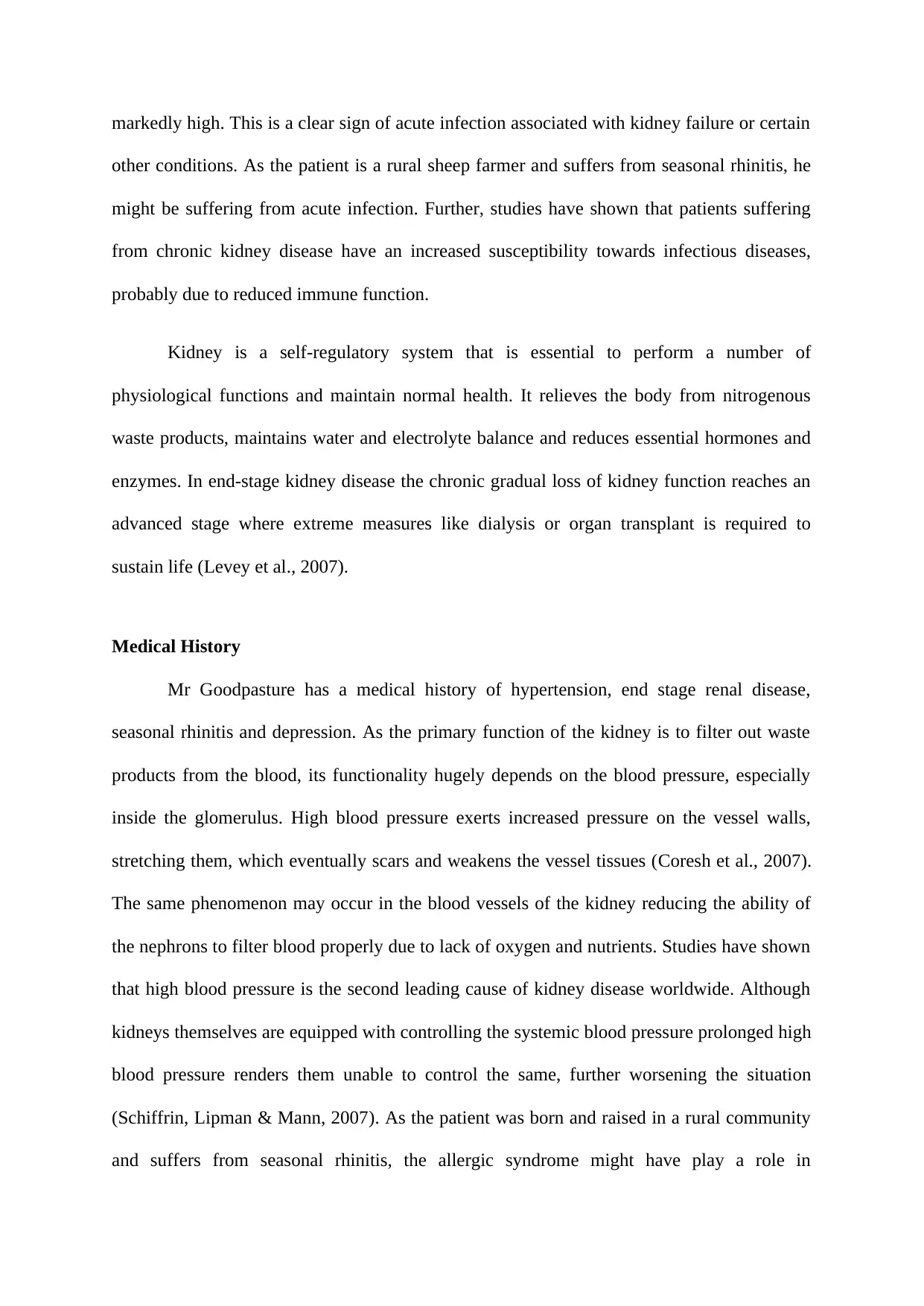
markedly high. This is a clear sign of acute infection associated with kidney failure or certain
other conditions. As the patient is a rural sheep farmer and suffers from seasonal rhinitis, he
might be suffering from acute infection. Further, studies have shown that patients suffering
from chronic kidney disease have an increased susceptibility towards infectious diseases,
probably due to reduced immune function.
Kidney is a self-regulatory system that is essential to perform a number of
physiological functions and maintain normal health. It relieves the body from nitrogenous
waste products, maintains water and electrolyte balance and reduces essential hormones and
enzymes. In end-stage kidney disease the chronic gradual loss of kidney function reaches an
advanced stage where extreme measures like dialysis or organ transplant is required to
sustain life (Levey et al., 2007).
Medical History
Mr Goodpasture has a medical history of hypertension, end stage renal disease,
seasonal rhinitis and depression. As the primary function of the kidney is to filter out waste
products from the blood, its functionality hugely depends on the blood pressure, especially
inside the glomerulus. High blood pressure exerts increased pressure on the vessel walls,
stretching them, which eventually scars and weakens the vessel tissues (Coresh et al., 2007).
The same phenomenon may occur in the blood vessels of the kidney reducing the ability of
the nephrons to filter blood properly due to lack of oxygen and nutrients. Studies have shown
that high blood pressure is the second leading cause of kidney disease worldwide. Although
kidneys themselves are equipped with controlling the systemic blood pressure prolonged high
blood pressure renders them unable to control the same, further worsening the situation
(Schiffrin, Lipman & Mann, 2007). As the patient was born and raised in a rural community
and suffers from seasonal rhinitis, the allergic syndrome might have play a role in
other conditions. As the patient is a rural sheep farmer and suffers from seasonal rhinitis, he
might be suffering from acute infection. Further, studies have shown that patients suffering
from chronic kidney disease have an increased susceptibility towards infectious diseases,
probably due to reduced immune function.
Kidney is a self-regulatory system that is essential to perform a number of
physiological functions and maintain normal health. It relieves the body from nitrogenous
waste products, maintains water and electrolyte balance and reduces essential hormones and
enzymes. In end-stage kidney disease the chronic gradual loss of kidney function reaches an
advanced stage where extreme measures like dialysis or organ transplant is required to
sustain life (Levey et al., 2007).
Medical History
Mr Goodpasture has a medical history of hypertension, end stage renal disease,
seasonal rhinitis and depression. As the primary function of the kidney is to filter out waste
products from the blood, its functionality hugely depends on the blood pressure, especially
inside the glomerulus. High blood pressure exerts increased pressure on the vessel walls,
stretching them, which eventually scars and weakens the vessel tissues (Coresh et al., 2007).
The same phenomenon may occur in the blood vessels of the kidney reducing the ability of
the nephrons to filter blood properly due to lack of oxygen and nutrients. Studies have shown
that high blood pressure is the second leading cause of kidney disease worldwide. Although
kidneys themselves are equipped with controlling the systemic blood pressure prolonged high
blood pressure renders them unable to control the same, further worsening the situation
(Schiffrin, Lipman & Mann, 2007). As the patient was born and raised in a rural community
and suffers from seasonal rhinitis, the allergic syndrome might have play a role in
⊘ This is a preview!⊘
Do you want full access?
Subscribe today to unlock all pages.

Trusted by 1+ million students worldwide
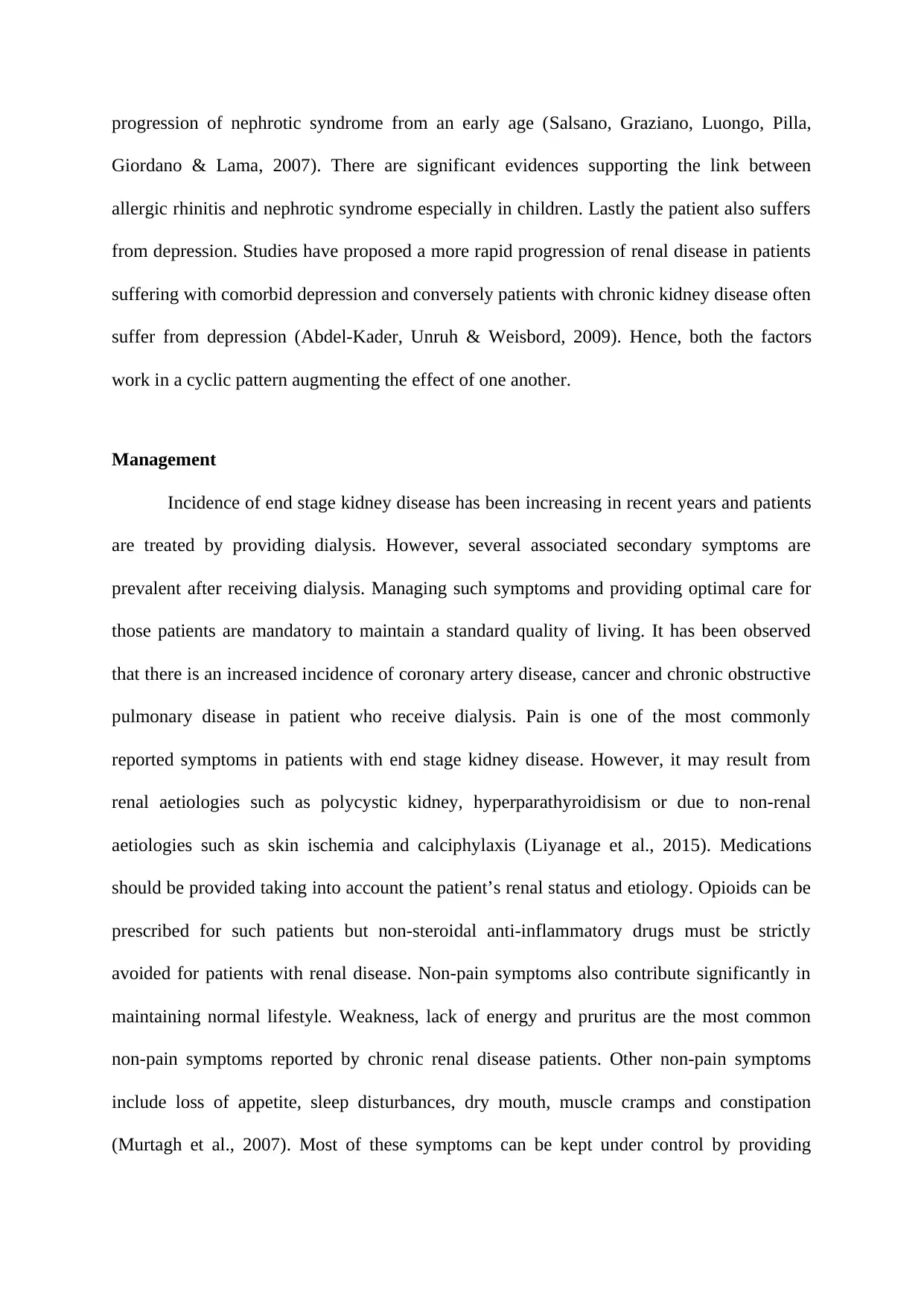
progression of nephrotic syndrome from an early age (Salsano, Graziano, Luongo, Pilla,
Giordano & Lama, 2007). There are significant evidences supporting the link between
allergic rhinitis and nephrotic syndrome especially in children. Lastly the patient also suffers
from depression. Studies have proposed a more rapid progression of renal disease in patients
suffering with comorbid depression and conversely patients with chronic kidney disease often
suffer from depression (Abdel-Kader, Unruh & Weisbord, 2009). Hence, both the factors
work in a cyclic pattern augmenting the effect of one another.
Management
Incidence of end stage kidney disease has been increasing in recent years and patients
are treated by providing dialysis. However, several associated secondary symptoms are
prevalent after receiving dialysis. Managing such symptoms and providing optimal care for
those patients are mandatory to maintain a standard quality of living. It has been observed
that there is an increased incidence of coronary artery disease, cancer and chronic obstructive
pulmonary disease in patient who receive dialysis. Pain is one of the most commonly
reported symptoms in patients with end stage kidney disease. However, it may result from
renal aetiologies such as polycystic kidney, hyperparathyroidisism or due to non-renal
aetiologies such as skin ischemia and calciphylaxis (Liyanage et al., 2015). Medications
should be provided taking into account the patient’s renal status and etiology. Opioids can be
prescribed for such patients but non-steroidal anti-inflammatory drugs must be strictly
avoided for patients with renal disease. Non-pain symptoms also contribute significantly in
maintaining normal lifestyle. Weakness, lack of energy and pruritus are the most common
non-pain symptoms reported by chronic renal disease patients. Other non-pain symptoms
include loss of appetite, sleep disturbances, dry mouth, muscle cramps and constipation
(Murtagh et al., 2007). Most of these symptoms can be kept under control by providing
Giordano & Lama, 2007). There are significant evidences supporting the link between
allergic rhinitis and nephrotic syndrome especially in children. Lastly the patient also suffers
from depression. Studies have proposed a more rapid progression of renal disease in patients
suffering with comorbid depression and conversely patients with chronic kidney disease often
suffer from depression (Abdel-Kader, Unruh & Weisbord, 2009). Hence, both the factors
work in a cyclic pattern augmenting the effect of one another.
Management
Incidence of end stage kidney disease has been increasing in recent years and patients
are treated by providing dialysis. However, several associated secondary symptoms are
prevalent after receiving dialysis. Managing such symptoms and providing optimal care for
those patients are mandatory to maintain a standard quality of living. It has been observed
that there is an increased incidence of coronary artery disease, cancer and chronic obstructive
pulmonary disease in patient who receive dialysis. Pain is one of the most commonly
reported symptoms in patients with end stage kidney disease. However, it may result from
renal aetiologies such as polycystic kidney, hyperparathyroidisism or due to non-renal
aetiologies such as skin ischemia and calciphylaxis (Liyanage et al., 2015). Medications
should be provided taking into account the patient’s renal status and etiology. Opioids can be
prescribed for such patients but non-steroidal anti-inflammatory drugs must be strictly
avoided for patients with renal disease. Non-pain symptoms also contribute significantly in
maintaining normal lifestyle. Weakness, lack of energy and pruritus are the most common
non-pain symptoms reported by chronic renal disease patients. Other non-pain symptoms
include loss of appetite, sleep disturbances, dry mouth, muscle cramps and constipation
(Murtagh et al., 2007). Most of these symptoms can be kept under control by providing
Paraphrase This Document
Need a fresh take? Get an instant paraphrase of this document with our AI Paraphraser
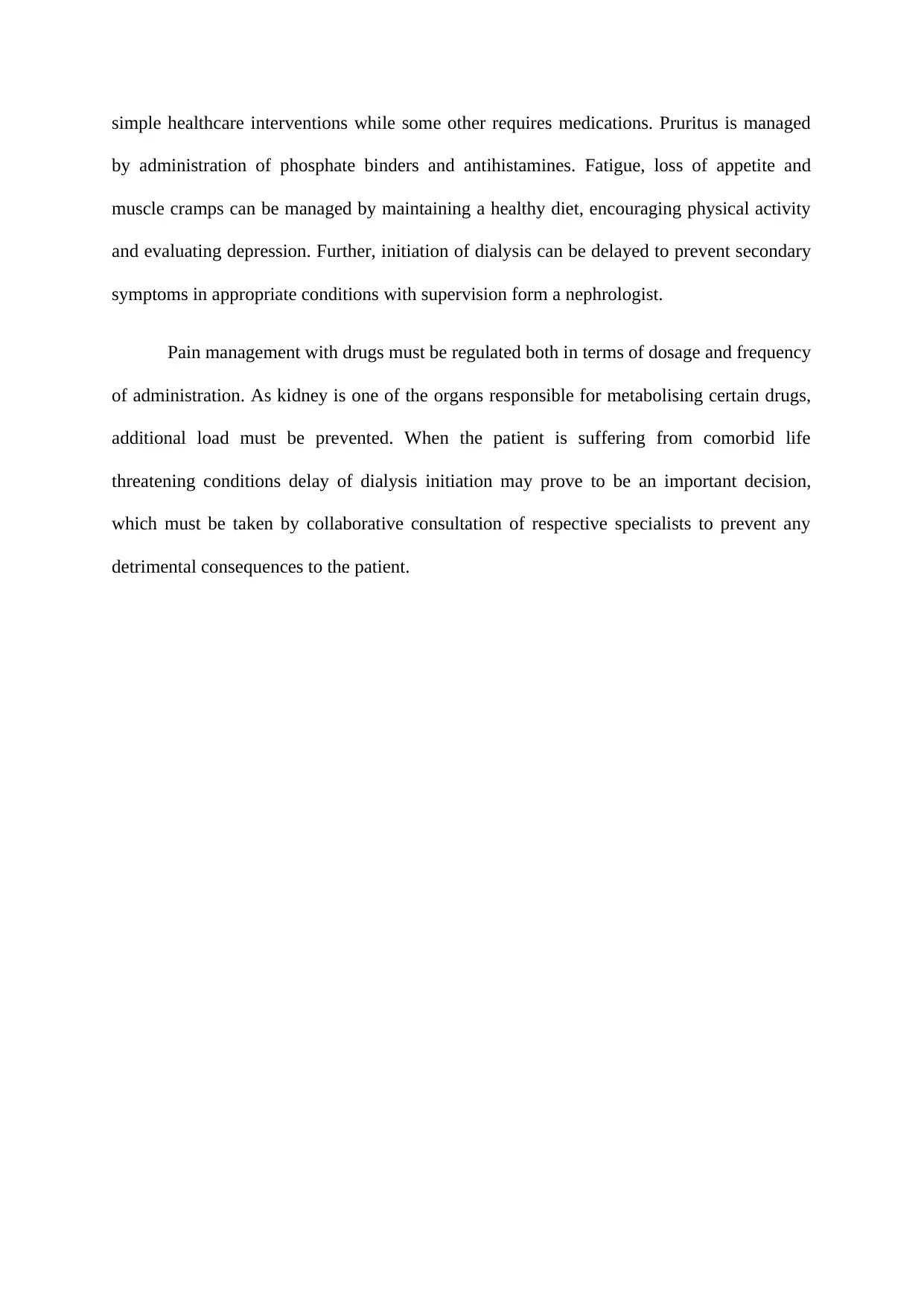
simple healthcare interventions while some other requires medications. Pruritus is managed
by administration of phosphate binders and antihistamines. Fatigue, loss of appetite and
muscle cramps can be managed by maintaining a healthy diet, encouraging physical activity
and evaluating depression. Further, initiation of dialysis can be delayed to prevent secondary
symptoms in appropriate conditions with supervision form a nephrologist.
Pain management with drugs must be regulated both in terms of dosage and frequency
of administration. As kidney is one of the organs responsible for metabolising certain drugs,
additional load must be prevented. When the patient is suffering from comorbid life
threatening conditions delay of dialysis initiation may prove to be an important decision,
which must be taken by collaborative consultation of respective specialists to prevent any
detrimental consequences to the patient.
by administration of phosphate binders and antihistamines. Fatigue, loss of appetite and
muscle cramps can be managed by maintaining a healthy diet, encouraging physical activity
and evaluating depression. Further, initiation of dialysis can be delayed to prevent secondary
symptoms in appropriate conditions with supervision form a nephrologist.
Pain management with drugs must be regulated both in terms of dosage and frequency
of administration. As kidney is one of the organs responsible for metabolising certain drugs,
additional load must be prevented. When the patient is suffering from comorbid life
threatening conditions delay of dialysis initiation may prove to be an important decision,
which must be taken by collaborative consultation of respective specialists to prevent any
detrimental consequences to the patient.
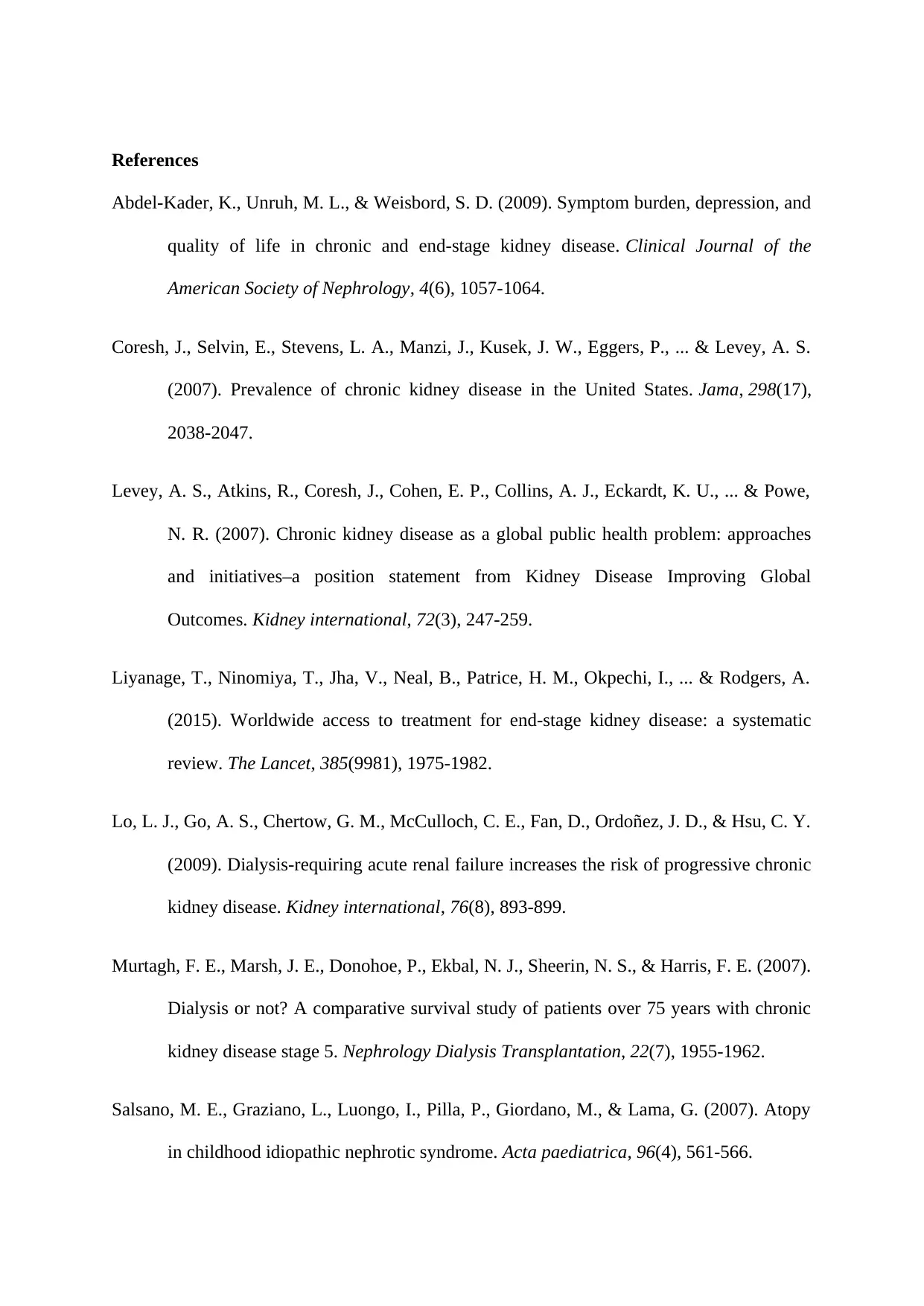
References
Abdel-Kader, K., Unruh, M. L., & Weisbord, S. D. (2009). Symptom burden, depression, and
quality of life in chronic and end-stage kidney disease. Clinical Journal of the
American Society of Nephrology, 4(6), 1057-1064.
Coresh, J., Selvin, E., Stevens, L. A., Manzi, J., Kusek, J. W., Eggers, P., ... & Levey, A. S.
(2007). Prevalence of chronic kidney disease in the United States. Jama, 298(17),
2038-2047.
Levey, A. S., Atkins, R., Coresh, J., Cohen, E. P., Collins, A. J., Eckardt, K. U., ... & Powe,
N. R. (2007). Chronic kidney disease as a global public health problem: approaches
and initiatives–a position statement from Kidney Disease Improving Global
Outcomes. Kidney international, 72(3), 247-259.
Liyanage, T., Ninomiya, T., Jha, V., Neal, B., Patrice, H. M., Okpechi, I., ... & Rodgers, A.
(2015). Worldwide access to treatment for end-stage kidney disease: a systematic
review. The Lancet, 385(9981), 1975-1982.
Lo, L. J., Go, A. S., Chertow, G. M., McCulloch, C. E., Fan, D., Ordoñez, J. D., & Hsu, C. Y.
(2009). Dialysis-requiring acute renal failure increases the risk of progressive chronic
kidney disease. Kidney international, 76(8), 893-899.
Murtagh, F. E., Marsh, J. E., Donohoe, P., Ekbal, N. J., Sheerin, N. S., & Harris, F. E. (2007).
Dialysis or not? A comparative survival study of patients over 75 years with chronic
kidney disease stage 5. Nephrology Dialysis Transplantation, 22(7), 1955-1962.
Salsano, M. E., Graziano, L., Luongo, I., Pilla, P., Giordano, M., & Lama, G. (2007). Atopy
in childhood idiopathic nephrotic syndrome. Acta paediatrica, 96(4), 561-566.
Abdel-Kader, K., Unruh, M. L., & Weisbord, S. D. (2009). Symptom burden, depression, and
quality of life in chronic and end-stage kidney disease. Clinical Journal of the
American Society of Nephrology, 4(6), 1057-1064.
Coresh, J., Selvin, E., Stevens, L. A., Manzi, J., Kusek, J. W., Eggers, P., ... & Levey, A. S.
(2007). Prevalence of chronic kidney disease in the United States. Jama, 298(17),
2038-2047.
Levey, A. S., Atkins, R., Coresh, J., Cohen, E. P., Collins, A. J., Eckardt, K. U., ... & Powe,
N. R. (2007). Chronic kidney disease as a global public health problem: approaches
and initiatives–a position statement from Kidney Disease Improving Global
Outcomes. Kidney international, 72(3), 247-259.
Liyanage, T., Ninomiya, T., Jha, V., Neal, B., Patrice, H. M., Okpechi, I., ... & Rodgers, A.
(2015). Worldwide access to treatment for end-stage kidney disease: a systematic
review. The Lancet, 385(9981), 1975-1982.
Lo, L. J., Go, A. S., Chertow, G. M., McCulloch, C. E., Fan, D., Ordoñez, J. D., & Hsu, C. Y.
(2009). Dialysis-requiring acute renal failure increases the risk of progressive chronic
kidney disease. Kidney international, 76(8), 893-899.
Murtagh, F. E., Marsh, J. E., Donohoe, P., Ekbal, N. J., Sheerin, N. S., & Harris, F. E. (2007).
Dialysis or not? A comparative survival study of patients over 75 years with chronic
kidney disease stage 5. Nephrology Dialysis Transplantation, 22(7), 1955-1962.
Salsano, M. E., Graziano, L., Luongo, I., Pilla, P., Giordano, M., & Lama, G. (2007). Atopy
in childhood idiopathic nephrotic syndrome. Acta paediatrica, 96(4), 561-566.
⊘ This is a preview!⊘
Do you want full access?
Subscribe today to unlock all pages.

Trusted by 1+ million students worldwide
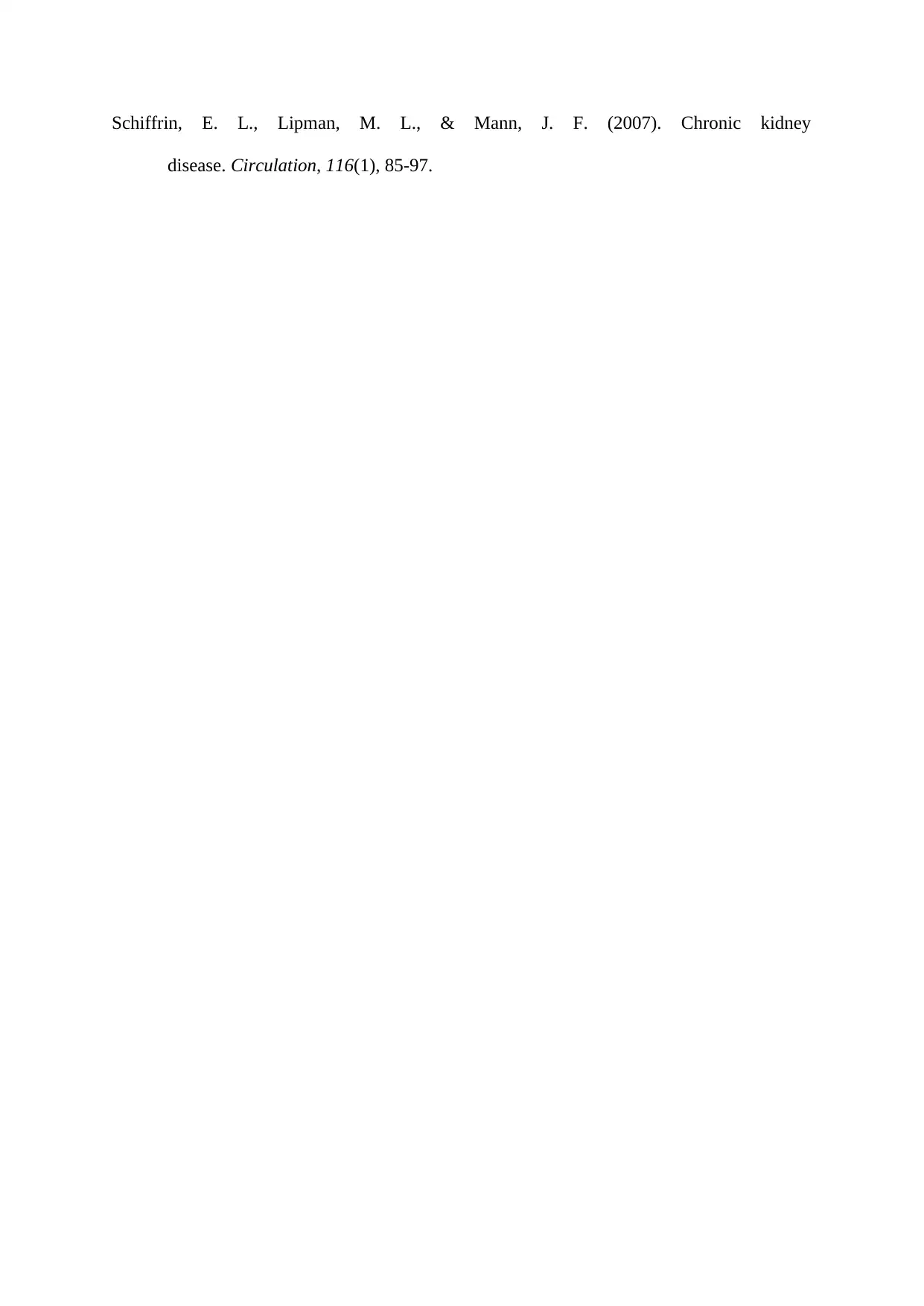
Schiffrin, E. L., Lipman, M. L., & Mann, J. F. (2007). Chronic kidney
disease. Circulation, 116(1), 85-97.
disease. Circulation, 116(1), 85-97.
1 out of 7
Related Documents
Your All-in-One AI-Powered Toolkit for Academic Success.
+13062052269
info@desklib.com
Available 24*7 on WhatsApp / Email
![[object Object]](/_next/static/media/star-bottom.7253800d.svg)
Unlock your academic potential
Copyright © 2020–2026 A2Z Services. All Rights Reserved. Developed and managed by ZUCOL.





